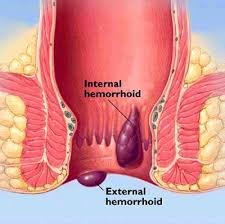HEMORRHOIDS
THE PILES
Author:
Dr. PRAMOD KUMAR
WHAT ARE TOLD AS Haemorrhoids/Piles

Haemorrhoids (HEM-uh-roids), also called piles, are swollen and inflamed veins in your anal canal and lower part of rectum. They may result from straining during bowel movements or from the increased pressure on these veins during pregnancy, among other causes.
Haemorrhoids may be as:
Internal Haemorrhoids located inside the rectum or
They may develop as External Haemorrhoids under the skin around the anus.
Haemorrhoids are common disease. By age 50, about half of adults have had to deal with the itching, discomfort and bleeding that can signal the presence of haemorrhoids.
Many effective options are available to treat haemorrhoids. Most people can get relief from symptoms by using home treatments and making lifestyle changes.
sIGNS & SYMPTOMS:
Signs and symptoms of haemorrhoids may include:
- Painless bleeding during bowel movements — you might notice small amounts of bright red blood on your toilet tissue or in the toilet bowl
- Itching or irritation in your anal region
- Pain or discomfort
- Swelling around your anus
- A lump near your anus, which may be sensitive or painful
- Leakage of faeces
- Its symptoms usually depend on the location. Internal haemorrhoids lie inside the rectum. You usually can’t see or feel them and they usually don’t cause any discomfort.
But during passing of stool, straining or irritation can damage a haemorrhoid’s delicate surface and due to it they may bleed.
Occasionally, straining can push an internal haemorrhoid through the anal opening. This is known as a protruding or prolapsed haemorrhoid and can cause pain and irritation.
External haemorrhoids are under the skin around your anus. When irritated, external haemorrhoids can itch or bleed. Sometimes blood may pool in an external haemorrhoid and form a clot (thrombus), resulting in severe pain, swelling and inflammation.
Bleeding during bowel movements is the most common sign of haemorrhoids. But rectal bleeding may also associated with other diseases, including colorectal cancer and anal cancer. Don’t assume that bleeding is coming from haemorrhoids without consulting a doctor.
Your doctor can do a physical examination and perform other tests to diagnose haemorrhoids and to rule out more-serious conditions or diseases. Also consider seeking medical advice if your haemorrhoids cause pain, bleed frequently or excessively, or don’t improve with home remedies.
If your haemorrhoid symptoms began along with a marked change in bowel habits or if you’re passing black, tarry or maroon stools, blood clots, or blood mixed in with the stool, consult your doctor immediately. These types of stools can signal more extensive bleeding elsewhere in your digestive tract.
Seek emergency care if you experience large amounts of rectal bleeding, light-headedness, dizziness or faintness.
CAUSES:
The veins around your anus tend to stretch under pressure and may bulge or swell. Swollen veins (haemorrhoids) can develop from an increase in pressure in the lower rectum. Factors that might cause increased pressure include:
Straining during bowel movements
Sitting for long periods of time on the toilet
Chronic diarrhoea or constipation
Obesity
Pregnancy
Anal intercourse
Low-fibre diet
Haemorrhoids are more likely as you get older because the tissues that support the veins in your rectum and anus could be weakened and stretch with aging.
COMPLICATIONS:
Complications of haemorrhoids are rare but include:
Anaemia: Chronic blood loss from haemorrhoids may cause anaemia, in which you don’t have enough healthy red blood cells to carry oxygen to your cells. This may result in fatigue and weakness.
Strangulated haemorrhoid: If blood supply to an internal haemorrhoid is cut off, the haemorrhoid may be “strangulated,” which can cause extreme pain and lead to tissue death (gangrene).
TREATMENT & MEDICATION
In case of Piles presently various methods are adopted for its treatment.
- Surgery: In this method the excision of haemorrhoids (Haemorroidectomy) is being done but in this case Re-occurrence of piles could not be avoided and generally their re-occurrence may be there.
- Injection treatment: 5% solution of Phenol in Almond oil is used to inject into the particular haemorrhoid and after a short time it will degenerates but it is not guaranteed that there may not any further occurrence of haemorrhoid.
- Kshar Sutra Ligation: This is most frequently used these days. Re-occurrence of the same haemorrhoid never found but no any proof is there that some other haemorrhoids will not occur. They may be there.
- Medicinal treatment: As the oral medicine cures the disease by correcting the system so it is more suitable and is the best option to choose. Some local applications may also be used side by side as per requirement.
We follow generally the last option.
So if anyone has a troublesome situation like it, then (s)he may contact to author of this article.
To Know more ……Click Here